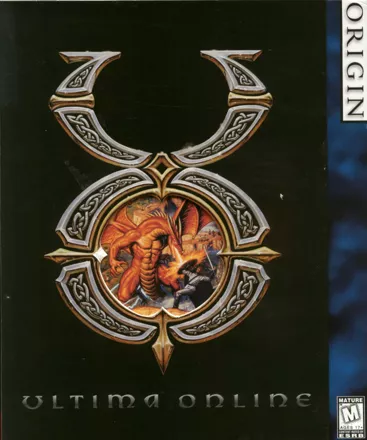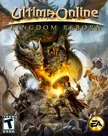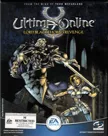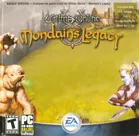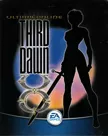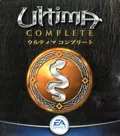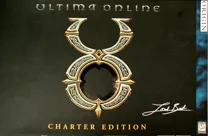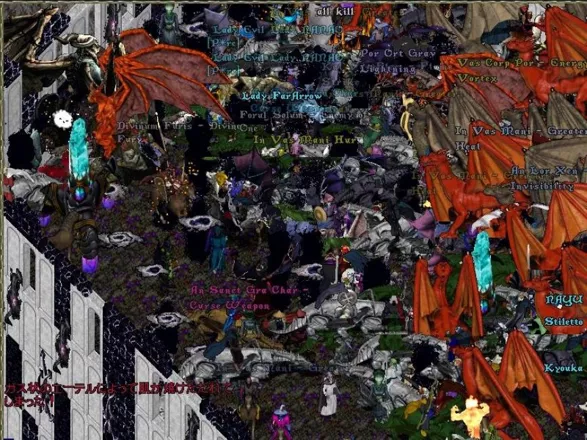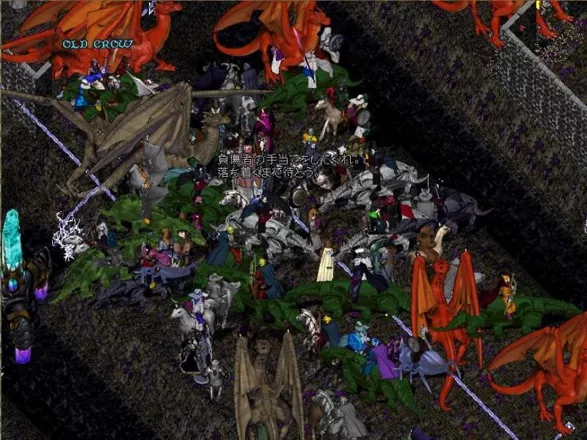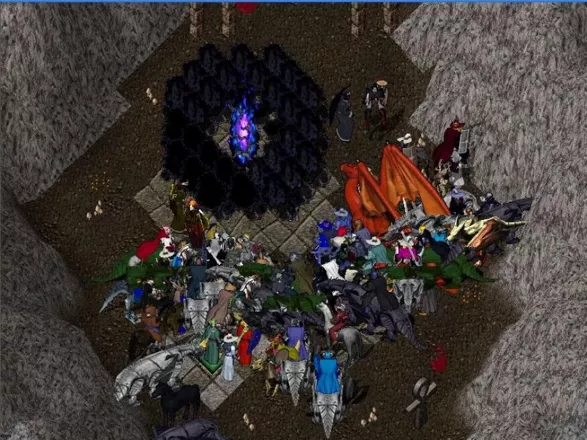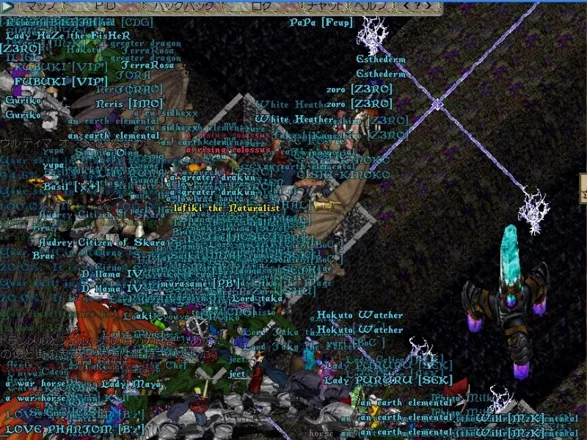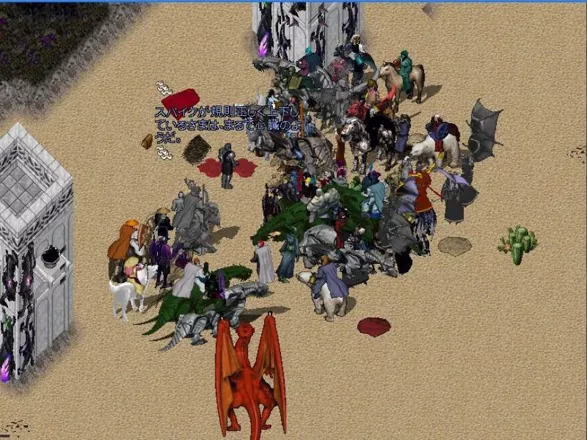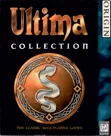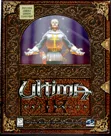Ultima Online
Description official descriptions
The first game to popularize the Persistent Online World, Ultima Online is a online RPG world that borrows its story from the Ultima series of games. Gamers create their virtual citizens of Britannia to follow a multitude of paths. The game is open-ended to provide all flavors of an RPG, whether it be a warrior, mage, or merchant. The game is presented top-down, and the game world is broken up of a huge mainland, and a number of islands. Just like in most RPGs, characters are advanced through skill, gained by fighting monsters in dungeons, or practicing a craft (or both).
Magic is done by collecting "reagents". The mage's skill determines what level of spell he/she can cast. A huge variety of spells and potions are available.
Items and weapons of almost every kind populate the land. The game uses gold currency to carry out transactions. Trades can also be conducted between players.
The game cost $10 a month to play. There are a variety of servers to play on, each allowing you to have 5 characters. Constant updates are made available to further enhance the product.
Spellings
- 网络创世纪 - Chinese spelling (simplified)
Groups +
- Fantasy creatures: Dragons
- Fantasy creatures: Orcs
- Fantasy creatures: Trolls
- Gameplay feature: Alchemy
- Gameplay feature: Character development - Repetition
- Gameplay feature: Character development - Training
- Gameplay feature: Horse riding
- Gameplay feature: House ownership
- Gameplay feature: Paper doll inventory
- Gameplay feature: Pickpocketing
- Gameplay feature: Survival cooking
- Protagonist: Female (option)
- Ultima Online series
- Ultima universe
Promos
Credits (Windows version)
89 People · View all
| Producer | |
| Associate Producer | |
| Director | |
| Project Consultant | |
| Director of Development | |
| Executive Assistant | |
| Design Manager | |
| Design Coordinator | |
| Additional Design |
|
| Lead Designer |
|
| Designers |
|
| Art Director | |
| [ full credits ] | |
Reviews
Critics
Average score: 78% (based on 17 ratings)
Players
Average score: 4.0 out of 5 (based on 36 ratings with 2 reviews)
The Good
The idea is great.
The Bad
The game is the absolute pits. Kudos to EA and Origin for trying to create the first really huge MMORPG, but this thing was a bug jar from the word Go. Assuming you could even log on and get the game to run smoothly - a rarity - you'd be killed by teenagers yelling "wE ROOL D00DZ" within seconds.
If you want to play a MMORPG, play EverQuest.
The Bottom Line
The box and its contents can be burned for heat in any fireplace!
Windows · by Rick Jones (96) · 2001
The Good
Compared to the majority of current MMORPGs, which have become little more than EverQuest clones, the early years of Ultima Online were truly revolutionary. Eight years after UO, I expected games with thriving economies, detailed crafting systems, and great player housing.
The focus of UO was community and player interaction, including PvP. I spent hundreds of hours working on my blacksmithing and mining skills, selling my wares using an NPC vendor, and leading a small guild of roleplayers. In those years, the Catskills Roleplaying Circle (CRPC) was a huge community that united dozens of guilds in everything from tavern nights to wars between elves and orcs. We had castles in the woods, forts, mining camps, and houses.
In EverQuest and its derivatives, the only method of advancement is gaining levels and equipment through PvE combat. There's no player housing, no way to change the world. UO was different. UO dared to be something so much more than a graphical MUD. It wasn't a game; it was an open-ended world.
The Bad
Lag was a constant issue, as was the daily server reset that inexplicably wiped out several hours of progress. There were quite a few exploitable bugs, including dupes and house break-ins.
And as with all online games, it inevitably attracted a huge number of assholes and idiots.
The Bottom Line
I haven't played UO in years, but pre-2000, if you played it with the right people, it was the greatest game in the world.
In my mind, UO is comparable to Daggerfall. Both games were engaging largely because they demonstrated so much potential for games of their genre. They both succeeded in creating the feeling of depth -- that there really was a huge world that you could never fully master. Unfortunately, they're also alike in that their demonstrated potential has never been achieved by subsequent games. And while you can still go back and play and enjoy Daggerfall again, this is sadly impossible with Ultima Online.
Windows · by Patrick Dawson (3) · 2006
Trivia
1001 Video Games
Ultima Online appears in the book 1001 Video Games You Must Play Before You Die by General Editor Tony Mott.
Alpha and beta test
Alpha testings begin in April, 1996 with a few thousand players participating. The event closes on May 20, '96 with a true apocalypse scenario when a supposed speech by Lord British and Lord Blackthorn turns out to be a "setup" with the two Lords summoning hoards of monsters to slay the unsuspecting crowd.
In July 1997 the second phase of Ultima Online beta test begins. Graphically, the beta has vastly improved from the alpha version, with many new and innovative gameplay features for its time. Despite the fact that the beta is full of bugs, exploits and a fair share of server downtime, it nevertheless proves once and for all that the market and technology is substantial enough for the game to prosper. The beta ends on September 23, '97. Once again in true doomsday fashion, thousands of daemons are summoned and set to run amok in the last few hours that the servers are up.
Custom SoundFonts
Ultima Online is one of the few games that support SoundFonts. The game documentation fails to mention this but if you browse to the C:\UO\MUSIC folder of the 1.25 client, you will find three sets of MIDI files. One for GM/GS devices, one for 512k SoundFont memory and one set for 4MB SoundFont memory. You may find audio captures of these SoundFont versions by Google Search.
Extras
The Ultima Online package came included with a "finely crafted cloth map of Britannia" and a "limited edition, solid pewter Ultima Online lapel pin".
Lawsuit
The Ultima Online Lawsuit:
March 3 1998 is a notable date for the gaming industry: it was the first time that gamers sued a software company because of evident problems with a computer game. Five plaintiffs filed a lawsuit against Origin Systems / Electronic Arts in San Diego County Superior Court concerning the massively multiplayer game Ultima Online. The registered UO user’s main accusation was that Origin had knowingly made promises on the game box that the company wasn’t able to keep. The plaintiffs thus sued for negligence, breach of contract, and intentional misrepresentation. An extract of the bill of indictment states that
“[Origin] falsely and fraudulently represented that the game Ultima Online would be playable '24 hours a day, everyday.' The true facts are that Ultima Online servers break down daily for hours at a time on a daily basis and Ultima Online cannot be played 24 hours a day everyday.
[Origin] falsely and fraudulently represented that the game could be played in real time. The true facts are that 'lag' time exists, and it can take minutes for a command on the keyboard or mouse to be implemented on the screen.
Further charges included Origin’s failure to explain on the game box that Ultima Online required a monthly subscription fee of $10 and a credit card, and that the minimum hardware requirements written on the box were inaccurate and too low. The complaint sought money and punitive damages for those offences.
With the lawsuit filed, attorney George Schultz went on to search for other enraged Ultima Online customers to join the cause. The more plaintiffs, the more likely that the court’s first decision would be favourable: whether the case was considered a “class action” or not. Class action means that the plaintiffs are not treated as individual cases, but acknowledged to be representatives for a whole class of possibly wronged users – giving the charges greatly increased weight. In the following months, the number of participants rose to a peak of 16, then gradually fell to the final amount of 6; too much paperwork had caused drop-outs. On September 30, Judge Judith McConnel denied the motion of class certification due to lack of evidence.
With this major setback even before the begin of the main trial, the prospects for the plaintiffs looked grim. Grim enough indeed to avoid the trial altogether – the two parties agreed to a mutual settlement. In January 5 1999, the case was closed with each group paying their own legal fees and no implication of guilt. Electronic Arts agreed to donate $15,000 to the San Diago Tech Museum of Innovation.
Did the first lawsuit filed by gamers do any good? According to Electronic Arts’ official comment on the outcome of the case, it was quite futile:
This lawsuit, which was filed by avid players of the game who continued to play extensively despite their complaints, was in our view without merit from the beginning, and served no purpose other than to harass and distract Electronic Arts and Origin from their business of making entertainment software. Such frivolous lawsuits stifle innovation and threaten the creative community's efforts to bring new technologies to the consumer./
On the other hand, Attorney George Schultz pointed out that Origin had promptly changed all of the criticised issues for the box of the UO add-on The Second Age, and fixed most of the technical problems. And as he told GameSpot:
I’ve had occasion to talk to developers from various game companies […] who have all indicated to me that our lawsuit made it easier for them to argue with the “suits” to keep working on a game before they put it out and release it.”
Rabbits
Ultima Online has been the butt of many jokes due to the fact that you can so easily get killed by rabbits. People have begun nicknaming it "Holy Grail Online", in reference to the comedy movie Monty Python and the Holy Grail, where there is a killer rabbit.
Reception
Origin did not expect Ultima Online to be a huge success. Unofficial company forecasts reckoned that no more than 30,000 copies could be sold, and maybe 5,000 subscribers would populate Britannia. This would still have been more than any other online game had at that time.
When the public beta test was announced in 1997, Origin charged the participants 5$ per copy to narrow the group down to the really dedicated players. Despite the cost, 50,000 applicants wanted to take part in the testing process.
Ultima Online was published in September 1997. By the end of the year, 60,000 people had registered their copy. Britannia was overrun by up to 30,000 people simultaneously at any time of the day -- too much for Origin’s servers. Huge bandwidth problems occurred, players complained about constant lags. Origins reaction was to invent the Shard system: Instead of one Britannia, several parallel ones were put online so that players could spread over these worlds.
With the technical difficulties taken care off, the UO community continued to grow at an astonishing rate. In 1998, Origin breached the 100,000 mark, and by February 2000, 150,000 active members ventured trough the Online-Britannias.
References
Upon Ultima Online's release, it was given the Coaster of the Year award by then-Computer Gaming World editor Johnny Wilson. Jabbing back at the writer, a new monster was created for UO: A slime, named "a jwilson". It is presumed that the creature no longer spawns on UO's servers.
Awards
- Computer Gaming World
- March 1998 (Issue #164) – Coaster of the Year
- September 2006 (Issue #266) – Introduction into the Hall of Fame
- GameSpy
- 2001 – #48 Top Game of All Time
- GameStar (Germany)
- Issue 02/1999 - #10 in the "100 Most Important PC Games of the Nineties" ranking
- Issue 01/2007 - One of the "Ten Most Influential PC-Games". (It is the first online-only multiplayer game with a sustaining success and is in its whole design the foundation for today's games as World of Warcraft. It is also the first gaming universe which had to find solutions for problems like server lags and the long-term steering of the economy.)
- PC Player (Germany)
- Issue 01/1998 - Best Online Game in 1997
- Power Play
- Issue 02/1998 – Best Online Game in 1997
- Issue 02/2000 – Best Online Game in 1999
Information also controbuted by Apogee IV, -Chris, Eurythmic, Maw, Rambutaan, Scott Monster
Analytics
Related Sites +
-
Has Origin Created the First True Online Game World?
A feature article on Gamasutra, prior to the game's launch, which talks with Origin Systems' Starr Long about the development, release, and hurdles of this early online game (Aug. 19th, 1997). -
Ultima Online
Previous official website (archived) -
Ultima Stratics
The stratics website for Ultima Online. A huge reference of material on every aspect of the game
Identifiers +
Contribute
Are you familiar with this game? Help document and preserve this entry in video game history! If your contribution is approved, you will earn points and be credited as a contributor.
Contributors to this Entry
Game added by John Morales.
Additional contributors: Ye Olde Infocomme Shoppe, Unicorn Lynx, mw, Sciere, Zeppin, Patrick Bregger, FatherJack, Evolyzer, TamaMan.
Game added June 26, 2000. Last modified March 9, 2025.


